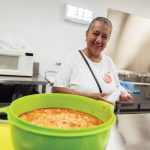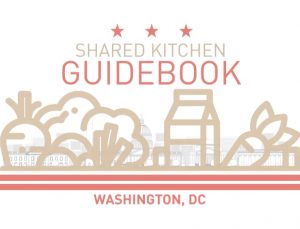Increase access to commercial kitchen space
Shared commercial kitchen spaces allow local food entrepreneurs to rent kitchen time as they need it and grow gradually, but licensing requirements for these spaces can be restrictive and confusing.
Shared kitchen spaces make it possible for food entrepreneurs to share equipment, test their recipes, and adapt their business models in a changing environment. Shared kitchen spaces are inspected, licensed commercial kitchens that allow local food entrepreneurs to rent kitchen time as they need it, paying hourly or with a monthly membership. As a result, entrepreneurs who would not be able to afford purchasing or building out commercial space of their own can grow gradually in a kitchen that complies with health requirements for preparing, cooking, holding, and storing food.

As some restaurants remain shuttered, shared kitchen spaces can allow local chefs to prepare meals safely and earn income for their families. City leaders should advocate for simple regulations that allow local chefs to start and use shared commercial kitchens.
Why is accessing affordable commercial kitchen space an issue in so many cities?
Regulations around sharing commercial kitchen space vary greatly between cities. Some cities, like DC, do not have an established process for licensing and regulating this business type, which can create confusion for both entrepreneurs and city officials. Others, like Chicago, have created a clear path for entrepreneurs who would like to start or use shared kitchen space, even bundling shared kitchen use permits with common food license types like street vending to reduce startup costs.
To increase access to food and jobs, cities should:
- Advocate for simple and straightforward regulations that allow entrepreneurs to start and use shared commercial kitchens.
- Make it easier for churches and other existing nonprofit kitchen spaces to become certified for commercial use. Allow restaurants to rent out their kitchen space when they are not using it. For example, a coffee shop and bakery that closes at 2:00pm each day could rent its kitchen out during the evenings.
- Allow flexibility for shared commercial kitchens to adapt their business model to include retail space or accommodate other needs as they arise. Successful standalone shared kitchens in places like DC and Chicago typically incorporate other activities that bring in revenue while supporting the entrepreneurs using the space, like creating a retail area where tenants can set up in stalls to sell their goods. This brings in business both for the chefs and for the kitchen space.
- Make it easy for shared kitchen spaces to offer food sanitation training, like ServSafe, which is mandatory for most food entrepreneurs. Offering more of these courses in more areas of a city helps ensure that aspiring food entrepreneurs can spend less time trekking the city to complete their training, and more time serving customers.
- Ensure that government officials issuing licenses for those starting and using a shared kitchen have multiple language resources for those who speak English as a second language.
Download this PDF for more information, and check out IJ’s Chicago and D.C. shared kitchen guides below.
Let’s get to work in your city.
Please fill out this form and an IJ staff member will reach out to you shortly.


